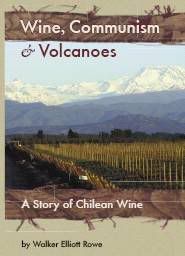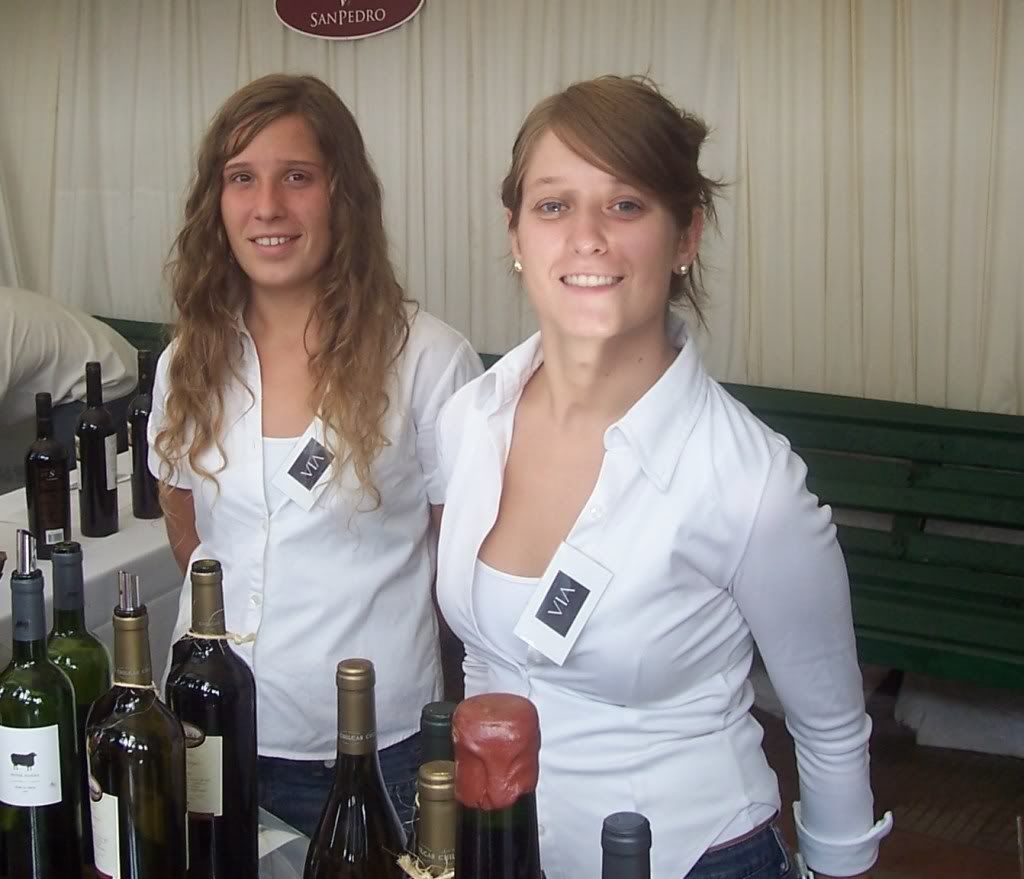Converting pesos to dollars----double it; divide by 1,000; then multiply times 90%. So 2,000 pesos (written "$2.000") equals $1.80 USD.
weather--it does not rain in the wine region and Santiago for 9 months of the year. Winter starts in May. Then the rain comes and the Chileans are awed by its apperance. The rain clears the contaminated air of Santiago where a system of "pica y placa" determines which automobiles can be driven on any particular day. The chileans bundle up in the day when the temperature drops to 10 degrees celcius (50 degrees farenheit) as if it was the Chilean Antartic while the gringo can go sleeveless. In July even the gringo is shivering as there is no central air heat and the hotels do not turn on the heat until 8 o'clock PM. People heat rooms with propane fired heaters and wooden stoves so one wonders whether they will die from carbon monixide poisoning. The Chileans have no natural gas of their own and are dependent on Argentina for that---to be dependant on Argentina for anything puts one in dire straits.
rodeo--In Chile cowboys do not lasso cows or ride a bucking bull until it tosses them off. Instead two cowboys ("huasos") mount horses and corral a steer into a wall gaining points depending where the horse makes contact--e.g. 4 points for the rear end. No gringo could possible understand this sport. The rules are listed here.
natural gas and hot water--if you stay in a hostal you might have to share a shower with others--well not at the same time unless that is the thrill you are seeking. If the hot water cuts off when your hair is filled with soap then the hot water heater is probably turned off. In Chile instead of heating gallons of water as we do in the states they use an on-demand type of system that heats water as it flow through the pipes. This uses natural gas for which the Chileans pay world market price so it's expensive. If you rent a house then perhaps the hot water heater is located on an outside wall and the pilot light can blow out in a really heavy wind. Propane tanks are delivered by truck or even by bicycle to the neighborhoods. You can relight the hot water heater yourself with a simple lighter and there is not much chance you will blow yourself up.
exiting a bus or an airplane--Chileans do not understand the concept of "first on last off". In gringolandia if you are sitting in, say, row 22 you let the people in row 21 get off first. Instead the Chileans--man, woman, child--push ahead comptelely oblivious of what to most would be logical.
soccer--"futbol" is more important here that what President Obama might be saying or the fact that the global economy is in free fall. The only thing that attracts more attention for the native is the soap opera ("telenovela") "Donde esta Elisa?" ("where is Elisa") which closely mirrors the comings and goings of the family who owns the nation's largest newspaper El Mercurio.
has been musicians--Where can you see Peter Frampton and The Brothers Johnson? Certainly not in the USA because they cannot earn a nickel there. So they head to the music festival at Vina del Mar where the natives do not know better. The Jonas Brothers are in Chile today? Does this portend their end?
news--television news starts at 9 o'clock at night on TVN. At the airport instead of CNN they broadcast music videos. It must be easy for the rest of the world to let the Americans alone worry about terrorism, famine, that sort of thing.
women--there are lots of single mothers ("madres soleteros") here. If they can get it they seek child support ("pension alimientos"). The gringo with $100 bills, a blue passport, and an odd accent has a decided advantage over the local womanizer ("mujer riego"). But Chileans, like Colombians, are not so poor, at least the upper tier. They glamorize themselves in the social pages of El Mercurio and have expensive houses in Las Condes and at the beach in Vina del Mar. The poor people are more comfortable in Valparaiso. As for The Spanish it is much easier to be charming if your speach is halting whatever the language. I find it charming that young girls often hold hand when they walk.
love--Chilean teenagers and young adults live with their parents so they go to "cabanas" for lovemaking which are motel rooms rented by the hour. There if you happen to have a car you can drive it behind a curtain where the adulterer can hide from the prying eyes of the detective's camera. There is a whole language for different degrees of courtship. If you female friends lets you have sex with her she is an "amiga con ventaja". If you are dating she becomes you "polola". Date her and no one else and she is your "novia". Marry and she becomes your "esposa". Divorce and--as is the case in the USA--she becomes your "ex".

school and English--the wealthier people send their children to private school ("collegios") and those most fortunate of all take private classes in order to score highly on the PSU (equivalent of the SAT) so they can go to college. Children who go to the collegios know English pretty well. Simple laborers earn about $1 per hour working in agriculture and are laid off after the grape harvest is done.
agriculture---The whole of the country from La Serena down to Concepcion is planted with grapes, onion, olives, whatever. Were it not for the irrigation which cuts across the country in aqueducts and canals it would all be dust. If you grow roses and live in the humid and wet east coast of the USA you will be envious how easily everything grows here without mildew.
coffee--Chileans export most of their agriculture it would seem keeping little of it for themselves. So they drink powdered drinks or buy cheap, watered down jugos ("juices"). Contrast this with Colombia where mango, blackberry, and other juices are drunk au natural without so much water. In the USA of course we prefer water, corn syrup, food coloring, and cancer causing concoctions which contains say 2% real fruit. Chile does not grow coffee. Instead of brewing ground beans they like it powdered. As for decaf they know not what that means.
sea food--clams ("almejas"), sea urchin, and and odd looking creature called "pico roco" are plentiful here sold by the cartful in the open air at Puerto Montt. For fish they have salmon in the South and congrio and reinata everywhere. I have never seen anything like what in the USA they call a "Chilean Bass" so presume that to be some invention of the gringo mentality.
waiting in line--if you go to the pharmacy to, say, recharge the balance on your cell phone take a number and wait. In Santiago, which is a large city, you have to wait in line for the pharmacy, the bank, to obtain service from the butcher and so forth. Chileans wait in line to pay bills at "servipago". In the USA I wait in line for nothing prefering to pay bills and buy tickets on the internet.
public telephone--it costs 100 pesos to call a land line ("linea fija") and 200 pesos to call a cell phone ("movil"). Dial 09 before each cell phone number.
la once--Chileans eat 4 times per day. breakfast ("desayuno"), lunch ("almuerzo"), dinner ("la cena"), and a light dinner at 5 o'clock (oddly enough called "la once" which means 11).
the work day--don't wake up at 5 o'clock and put on your running shows and head out to Starbucks. Shops here don't open until 10 and children go to school in shifts. For this reason you will see lots of school kids on the street at night when you would imagine they should be home fighting with their siblings.
dogs--dogs are free to wander all over Chile and no one cares. You will see them sleeping on the streets and crossing with pedestrians to the rythym of traffic lights ("semaforos"). In the USA someone seeing a stray would call the police and the dog squad would descend in great numbers perhaps with guns drawn.
cell phones--buy a prepaid cell phone in the USA and pay over the internet to have it unlocked. Make sure it is a GSM phone. Then here you can buy a SIM card and a prepaid cell phone card ("tarjeta") in order to recharge ("recarga") the balance ("saldo"). Chile under Pinochet embraced Ronald Reagan, Margaret Thatcher, and free-wheeling capitalism while electing socialts to office since then. Consequently there are multiple cell phone companies vying for your business. When you call someone it is free or them which is good when you are dating a girl who has no money, honey.
paying for stuff--In Chile you pay the "cajera" (cashier) after first choosing a product from one counter, perhaps retrieving it from another, then finally paying for it at a third. The system is bureaucratic with even the smallest stores having at least two steps in this three step process. They will always give you a receipt ("boleto") which is one reason Chile is known as a country where they is little corruption, well comparated to say Ecuador or Argentina, since there is this paper trail.
swimming pools--apparently no one swims in Santiago for there is one indoor pool ("piscina techada"), the YMCA, and it costs $12 per day to swim there. As for the ocean it is too cold for lots of people unless you are used to the Pacific chill in California.
police--the national police here are called "carbineros". They are professional and courteous and will not accept bribes ("morditas"). Argentine drivers accustomed to paying bribes to avoid a traffic ticket are arrested here when they try that.
illegal immigrants---as the USA is overrun with Mexicans Chile is overun with Peruvians. That is why you will see signs “for rent” ("se arrienda") only Chileans.
Wifi internet---buy a prepaid mobile broadband card from Falabella or Ripleys or Paris. It will cost $100 and the first two months might be free. So no contract required. The service providers are EntelPC, Movistar, and Claro. When you go back to home just give it away to someone else.
Public transport----taxis are cheap but collectivos are cheaper. A “collectivo” can mean a bus or a taxi that runs in the same loop day in and day out. On the windshield it says for example “$200”. That would be 38 cents. These cabs are shared. You can tell the driver when you pay “se paga” meaning "I am paying you now". When you want to get off say “la esquina por favor” meaning “drop me off at the corner.” The subway in Santiago is clean and efficient. Buy a BIP card and use it to board the bus and the metro. Push the button near the door to signal your descent. In order to plan your trip around santiago use http://www.transantiagoinforma.cl/deDonde.do
tips—a tip is a “propina”. For meals it is 10% or zero and there is no place on the credit card receipt to attach it. For taxis it is zero.
hookers--legal. Not much more need be said. Larger towns will have a red light district. If you are looking for the traditional burlesque show go to a "cafe con piernes" where topless women serve drinks over the bar.
petty crime--Chile is free of the kipnapping and extortion problems or Colombia and Mexico. But here there is petty and sometimes violent crimes from criminials ("delincuentes"). Watch your camera and your back pack.
Credit cards---every time you use your credit card they will ask for your “RUT”. This is like a social security number. Just make up a 7 digit number or write down your passport number. No one will ask to see your passport except maybe the Chinese restaurants whose owners are adrift between two cultures. Also know that the cashier will ask you if you would like to pay in installments ("cuotas") and whether you want to donate 100 pesos to the poor. Just say "sin cuotas".
refrigeration--my first wife came from Ecuador a country where meat is sold in the open air without refrigerationand people pile in 7 to a vehicle without seat belts. She threatened me bodily if I took our 11 year old son to the store without his child restraint system and her family all wanted their food cooked well done. When my mother-in-law and sister-in-law came over for a cookout I simply burned what they ate and they appeared pleased. As for Chile and Colombia don't look for eggs in the refrigerated section of the dairy. The are on the counter. As one who has farmed chickens I can tell you a hen lays her egg in 90 or 100 degree temperatures and it can sit there days or weeks without spoiling. One reasons eggs in the USA are refrigerated is they are sold old, months old in many cases. An egg yoke should be bright yellow. If it is grey, as they usually are at the Walmart and elsewhere, it indicates age. "Botalo"--i.e. trash it. I buy only brown or organic eggs as the conditions in which chickens are raised on factory farms are filthy and disgusting.
sex--The gringo culture is rather uptight. We have The Moral Majority, Mothers Against Drunk Drivers, Right to Lifers, militant Lesbian feminists all railing again what THEY consider to be immoral. In Chile--a Catholic country where divorce was only made legal a few years ago--there is little of this tyrrany of the Moral Minority. This is also the case in Colombia, Mexico, Panama, Ecuador, everywhere beyond the stifling confines of USA victorian mores. Here women wear thong bathing suits while they are arrested for doing the same where I was born at Litchfield Beach, South Carolina. It is 1:30 AM here now and I am watching a burlesque show on broadcast television. There is no FCC here to impose the will of the religious right on the rest of us. The telenovelas are almost soft born with steamier scenes than you would ever see on, say, Days of Our Lives. Prostitution is legal while--owing to the influence of the church---abortion usually is not but even that is changing. Which country is more free? If I could say more I would add to this burden the misery which is inflicted by the legal system in America which stifles so many aspect of our lives with "no running", "no trespassing", "no skateboarding", "no regard" for what is logical the lunacy havencompletely haven got out of hand.








2 comments:
Thanks for the post. I was looking for what "sin cuotas" means, and Google popped this up.
Haha, I also was looking for what "sin cuotas" was for Chile. Good little read though! Muchas Gracias!
Post a Comment